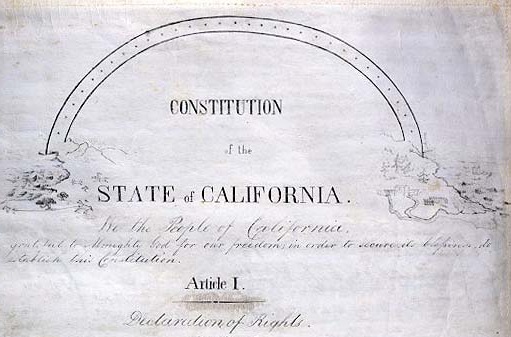
Capitol Building. (Photo: Kevin Sanders for California Globe)
Direct Democracy Statutes and Cases Interpreting Them
Ballot measures and recalls
By Chris Micheli, June 10, 2019 6:28 am
The California Elections Code provides for aspects of direct democracy in this state. There have been many court decisions interpreting key provisions of the Elections Code. The following cases highlight some of the main decisions interpreting these statutory provisions.
Initiatives and Referenda
Who are the proponents of a measure?
The “proponents” of a measure are those persons who commence the qualifications procedure by presenting to the Secretary of State a request for preparation of a title and summary of the initiative. Hardie v. Fong Eu (1976) 18 Cal.3d 371, certiorari denied
Word limit for title and summary
The Attorney General’s estimate of the fiscal impact of a proposed initiative does not count toward the statutory 100-word limit for the AG’s “title and summary” of the initiative petition. Holmes v. Jones (2000) 83 Cal.App.4th 882, review denied
Language of ballot measures
The textual differences between a proposed initiative measure attached to circulated petitions and one attached to the state ballot pamphlet were either due to corrections of clerical and grammatical errors or due to legislative revisions to statutes impacted by the proposed measure between the time of the measure’s circulation with the petition and election and, thus, the proposed initiative was lawfully presented to the voters, absent any evidence that the text in the pamphlet did not substantially comply with the Elections Code or that petition signers were misled by the differences. In conducting an inquiry as to whether alleged deficiencies in a ballot measure affected the ability of voters to make an informed choice, courts should examine the extent of pre-election publicity, canvassing and other informational activities, as well as the substance or content of such efforts. In addition, courts should take into account the materiality of the omission or other informational deficiency; flaws striking at the very nature and purpose of the legislation are more serious than other, more ancillary matters. When a challenge to alleged deficiencies in a ballot measure is made postelection, the matter is reviewed to determine whether there was substantial compliance with the Elections Code and whether the purported deficiencies affected the ability of the voters to make an informed choice. Postelection invalidation of a ballot measure is only required if the materials, in light of other circumstances of the election, were so inaccurate or misleading as to prevent the voters from making informed choices. People v. Scott (2002) 98 Cal.App.4th 514
Attorney General providing title and summary
The Attorney General complied with the mandate that he or she provide the electorate with a “true and impartial statement of the purpose of the measure” by essentially repeating operative language of the ballot initiative. The ballot title and summary for an initiative measure must reasonably inform the voter of the character and real purpose of the proposed measure. The mandate to the Attorney General in preparing the official summary of the voter initiative is to state the purpose and effect of the measure, not to reiterate selective fragments of public commentary and debate on the measure. Lungren v. Superior Court (1996) 48 Cal.App.4th 435, review denied
Purpose of the title and summary
The main purpose of the pre-election initiative ballot title and summary requirements is to avoid misleading the public with inaccurate information. In ruling on a challenge to the sufficiency of a ballot title and summary, the courts are not vested with a wide range of discretion; relief may be granted only upon clear and convincing proof that the challenged ballot materials in question are false, misleading or inconsistent with the requirements of the Elections Code. A court considering a challenge to the ballot materials must refer to the entire initiative to determine its purpose and intent, even when there is no ambiguity in the statutory provisions. The initiative’s language must be construed in the context of the statute as a whole and the initiative’s overall scheme. A difference of opinion does not rise to the level of clear and convincing proof that the challenged language in a ballot initiative title and summary and the ballot label is misleading. If reasonable minds may differ as to its sufficiency, the ballot initiative’s title and summary prepared by the Attorney General must be upheld because all legitimate presumptions should be indulged in favor of the propriety of the Attorney General’s actions. Only in a clear case should a title and summary so prepared be held insufficient. As a general rule, the ballot initiative title and summary prepared by the AG are presumed accurate and substantial compliance with the “chief purpose and points” provision is sufficient. Yes on 25, Citizens for an On-Time Budget v. Superior Court (2010) 189 Cal.App.4th 1445
Preparation of fiscal impact
The preparer of a ballot pamphlet summarizing the meaning and effect of a ballot measure necessarily exercises a discretionary function requiring courts to allow considerable latitude when the result is challenged as incomplete or inaccurate. The Legislative Analyst, in preparing the ballot pamphlet, is called upon only to make a rational judgment about what effects are most likely to matter to voters, and to describe them in a fair and intelligible way; inherent in this undertaking is the necessity of informational triage, of determining what details are necessary to form an adequate understanding and what details may be omitted. People v. Cordova (2016) 248 Cal.App.4th 543
Recalls
Individualized nature of recall petitions
The purpose of statutes requiring that recall petitions each be individuated, be concerned with a specific official, and give that official the right to include his or her own answer to the recall petition are to require potential petition signers to judge each specific official on his or her own individual merits after being exposed to both sides of the question of whether he or she should be recalled. Capo for Better Representation v. Kelley (2008) 158 Cal.App.4th 1455
Ministerial function of recall order
California statutes governing the issuance of an order for a recall election and the time for a recall election make the ordering of a recall election a purely ministerial function with no discretion involved. Imperial v. Castruita (2006) 418 F.Supp.2d 1174
“Yes” versus “no” vote at recall election
The words “recall election” in California elections statutes providing that if one-half or more of the votes at a recall election are “no,” then the officer sought to be recalled shall continue in office, are synonymous with the words “recall proposal” in a separate statute providing that, if a majority of the votes on a recall proposal are “yes,” then the officer sought to be recalled shall be removed from office upon the qualification of his or her successor. Partnoy v. Shelley (2003) 277 F.Supp.2d 1064
- Senate Proposes Equity Impact Analysis of Legislation - April 18, 2024
- Interesting Provision in Social Media Bill - April 18, 2024
- Frequently Asked Questions about Legislative Review of State Agencies - April 18, 2024



